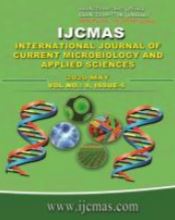


 National Academy of Agricultural Sciences (NAAS)
National Academy of Agricultural Sciences (NAAS)

|
PRINT ISSN : 2319-7692
Online ISSN : 2319-7706 Issues : 12 per year Publisher : Excellent Publishers Email : editorijcmas@gmail.com / submit@ijcmas.com Editor-in-chief: Dr.M.Prakash Index Copernicus ICV 2018: 95.39 NAAS RATING 2020: 5.38 |
A study was conducted to evaluate the effect of phytobiotics on carcass characteristics of Nandanam broiler-3 chicken. A total of 120 day-old Nandanam broiler-3 chicks were randomly allotted into four treatments with three replicates each 10 chicks. The dietary treatments were formulated as control fed with basal diet (T1) and basal diet supplemented with 0.50 % ginger powder (T2) or garlic paste (T3) or turmeric powder (T4). At the end of 8 weeks of age, six birds (3 males and 3 females) were randomly selected and subjected to slaughter studies to determine the carcass characteristics. The results indicated that digestive stimulant effect of turmeric (T4) had resulted in increased per cent eviscerated (63.71%) and ready-to cook (69.71%) weights which is followed by other treatment groups (T2 and T3) compared to control (T1). The per cent cut-parts of breast, back, thigh and wings were significantly (P<0.05) higher in T4 compared to other treatment groups. Significant (P>0.05) differences were observed in per cent head, gizzard and intestine length (cm) among the treatments. There was no significant difference observed in per cent blood, feather, shank, liver, heart and giblets. There was no significant difference observed on drumstick and neck parts also.
 |
 |
 |
 |
 |